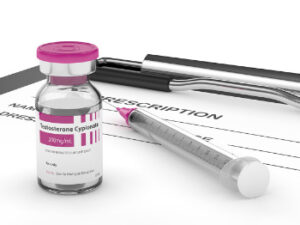In recent years, TRT therapy has garnered attention as a potential solution for age-related declines in testosterone levels. However, along with its promises come questions about its efficacy and safety. In this article, we’ll delve into the potential benefits and risks of TRT therapy, shedding light on its role in addressing testosterone deficiencies and promoting overall well-being.

What is Testosterone?
Testosterone, a pivotal hormone, is predominantly synthesized in the testicles among men and to a lesser extent in the ovaries among women. Its significance extends across diverse bodily functions, encompassing muscle mass development, libido regulation, bone density maintenance, and mood modulation. Through Testosterone Replacement Therapy (TRT), individuals experiencing testosterone deficiencies can seek to address imbalances and restore optimal hormone levels.
TRT treatment offers a targeted approach to supplementing testosterone levels, aiding in mitigating symptoms associated with low testosterone, such as fatigue, diminished muscle mass, and changes in mood. By administering TRT treatment, healthcare providers aim to optimize hormone levels to promote overall well-being and vitality.
Through tailored TRT therapy plans, individuals can potentially experience enhancements in energy levels, libido, muscle mass, and mood stability, contributing to an improved quality of life. As individuals explore TRT therapy options, it’s essential to consult with healthcare professionals to ensure personalized treatment approaches aligned with individual needs and goals, maximizing the potential benefits of TRT therapy while minimizing associated risks.
What Happens to Testosterone Levels with Age?
As individuals age, testosterone levels undergo a natural decline, typically commencing around the age of 30. This decline, while gradual, manifests noticeable changes over time, including diminished muscle mass, decreased libido, fatigue, and mood fluctuations. Testosterone Replacement Therapy (TRT) emerges as a viable solution to address age-related testosterone decline. Through tailored TRT treatment plans, individuals experiencing symptoms of low testosterone can seek to restore hormonal balance and alleviate associated symptoms.
By administering TRT therapy, healthcare providers aim to optimize testosterone levels, potentially mitigating the adverse effects of age-related testosterone decline. TRT treatment offers a targeted approach to supplementing testosterone levels, promoting overall well-being and vitality among individuals experiencing age-related hormonal imbalances. As individuals consider TRT therapy options, consultation with healthcare professionals is imperative to ensure personalized treatment approaches aligned with individual needs and goals, facilitating optimal outcomes and quality of life.
Does a Naturally Declining Testosterone Level Cause the Signs and Symptoms of Aging?
While it’s commonly believed that declining testosterone levels contribute to signs and symptoms of aging like decreased energy and changes in sexual function, it’s crucial to acknowledge the multifactorial nature of these changes. Aging involves a complex interplay of various physiological, psychological, and environmental factors that can impact energy levels, sexual function, and overall well-being.
Lifestyle factors such as diet, exercise, stress levels, and sleep quality can also significantly influence these symptoms. Therefore, while declining testosterone levels may play a role in certain age-related changes, they are just one piece of the puzzle. It’s essential to consider the broader context of individual health and lifestyle factors when assessing and addressing the signs and symptoms of aging. Consulting with a healthcare provider can help identify contributing factors and develop appropriate strategies to promote overall health and vitality as individuals age.
Can Testosterone Therapy Promote Youth and Vitality?
Testosterone Therapy (TRT) endeavors to restore testosterone levels in individuals with deficiencies. By bringing testosterone levels back to within normal ranges, TRT may alleviate symptoms linked to low testosterone, including fatigue, diminished muscle mass, and decreased libido. This restoration could potentially foster a sense of vitality and overall well-being. TRT therapy offers a targeted approach to addressing hormonal imbalances, aiming to enhance quality of life for individuals experiencing symptoms of low testosterone.
Through personalized TRT treatment plans, healthcare providers seek to optimize hormone levels and alleviate associated symptoms, empowering individuals to reclaim a sense of youthfulness and vitality. It’s important for individuals considering TRT therapy to consult with healthcare professionals to discuss potential benefits, risks, and personalized treatment approaches tailored to their specific needs and health goals.
What are the Risks of Testosterone Therapy for Normal Aging?
While TRT therapy can offer benefits, it’s not without risks. Potential risks of testosterone therapy for normal aging include an increased risk of cardiovascular complications, prostate enlargement, infertility, and mood disturbances. It’s crucial to weigh the potential benefits against the risks and discuss any concerns with a healthcare provider.
Should You Talk to Your Doctor About Testosterone Therapy?
If you’re experiencing symptoms of low testosterone or are considering TRT therapy, it’s essential to consult with a healthcare provider. A thorough evaluation can help determine if TRT therapy is appropriate for you and ensure that potential risks are carefully considered and managed.
Are USA-Based Supplements Beneficial Instead of TRT Therapy?
In lieu of opting for TRT therapy, certain individuals may consider alternative solutions, such as USA-based supplements, to bolster testosterone levels. These supplements, manufactured in the United States, adhere to rigorous regulations and quality control standards, ensuring their safety and efficacy. USA-based supplements offer a potentially safer and more natural approach to addressing testosterone deficiencies, providing individuals with a viable option to support their male sexual health.
One of the primary benefits of USA-based supplements lies in their transparency and accountability. Manufacturers in the United States are required to follow strict guidelines set forth by regulatory bodies, guaranteeing the purity and potency of their products. Additionally, USA-based supplements often undergo thorough testing and scrutiny, assuring consumers of their quality and reliability.
Moreover, USA-based supplements frequently incorporate scientifically-backed ingredients known for their efficacy in promoting male sexual health. These supplements may contain a blend of vitamins, minerals, and herbal extracts that have been studied for their potential to enhance libido, improve erectile function, and support overall sexual performance.
Consulting with a healthcare provider can help individuals determine the most suitable treatment approach for their individual needs, whether it involves TRT therapy or the incorporation of USA-based supplements into their regimen. By exploring alternative options and discussing them with a healthcare professional, individuals can make informed decisions to address their testosterone deficiencies and optimize their male sexual health.
Conclusion
In conclusion, TRT therapy can offer potential benefits for individuals experiencing testosterone deficiencies, including improvements in energy levels, muscle mass, libido, and overall well-being. However, it’s essential to approach TRT therapy with caution and awareness of potential risks. Consulting with a healthcare provider is crucial to ensure safe and appropriate treatment.
Frequently Asked Question
Question: What are the potential benefits of TRT therapy?
Answer: TRT therapy, or testosterone replacement therapy, offers several potential benefits for individuals with low testosterone levels. These benefits may include increased energy levels, improved mood and sense of well-being, enhanced libido and sexual function, and gains in muscle mass and strength. TRT therapy can help alleviate symptoms associated with low testosterone, leading to improvements in overall quality of life.
Question: What are the risks associated with TRT therapy?
Answer: While TRT therapy can offer benefits, it’s essential to be aware of potential risks. Risks associated with TRT therapy may include an increased risk of cardiovascular complications such as heart attack or stroke, prostate enlargement, infertility, acne, fluid retention, and changes in mood or behavior. It’s crucial to discuss potential risks with a healthcare provider before starting TRT therapy and to undergo regular monitoring to ensure safety and efficacy.
Question: How does aging affect testosterone levels?
Answer: Testosterone levels naturally decline with age, typically starting around the age of 30. This decline is gradual and can result in symptoms such as decreased energy levels, reduced muscle mass, diminished libido, and changes in mood. While aging is a significant factor in declining testosterone levels, other factors such as lifestyle habits, underlying health conditions, and medications may also contribute to changes in testosterone levels over time.
Question: Can lifestyle changes help improve testosterone levels?
Answer: Yes, certain lifestyle changes may help improve testosterone levels naturally. These changes may include maintaining a healthy weight, engaging in regular exercise, getting an adequate amount of sleep, managing stress levels, and ensuring proper nutrition. Additionally, avoiding excessive alcohol consumption and smoking can also support healthy testosterone levels. However, it’s essential to consult with a healthcare provider before making significant lifestyle changes, especially if considering TRT therapy.
Question: What should I discuss with my doctor before starting TRT therapy?
Answer: Before starting TRT therapy, it’s crucial to have a thorough discussion with a healthcare provider. Topics to discuss may include your symptoms and concerns, medical history, current medications, lifestyle habits, and any potential risks or side effects associated with TRT therapy. Your healthcare provider can help determine if TRT therapy is appropriate for you and develop a personalized treatment plan tailored to your individual needs and goals.

